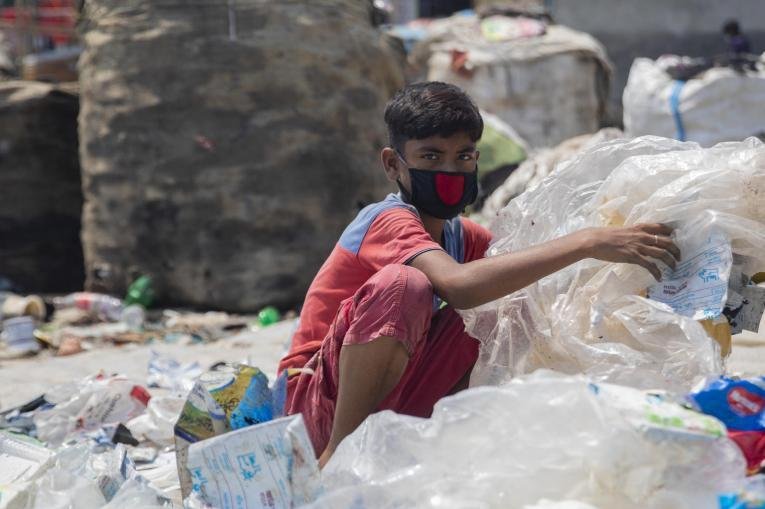A 12-year-old boy sorts through hazardous plastic waste in Dhaka, Bangladesh, to support his family amid the coronavirus pandemic. Photo courtesy of UNICEF
June 12 (UPI) -- The economic crisis caused by the coronavirus pandemic threatens to force millions of children into low-paying and dangerous jobs to help their families survive, which may lead to the first rise in child labor in at least two decades, the United Nations warned on Friday.
A joint report published by UNICEF and the International Labor Organization said increased economic insecurity, clogged supply chains, shuttered manufacturing and strained government coffers for social security caused by the COVID-19 pandemic are forcing families into poverty and may result in millions of children seeking dangerous and exploitive work.
Those already working as child laborers may feel pressure to work longer hours under worsening conditions, which could be detrimental to their health and safety, the report said.
"As the pandemic wreaks havoc on family incomes, without support, many could resort to child labor," ILO Director-General Guy Ryder said in a statement. "Social protection is vital in times of crisis, as it provides assistance to those who are most vulnerable. Integrating child labor concerns across broader policies for education, social protection, justice labor markets and international human and labor rights makes a critical difference."
The coronavirus, which first emerged late last year in Wuhan, China, before spreading around the globe, has forced countries to close their borders, place their citizenry under lockdown and close all but essential businesses, causing markets to contract the world over.
According to a report published earlier this week by the Organization for Economic Co-operation and Development, the pandemic could create "the most severe recession in nearly a century" with global gross domestic product potentially contracting by 7.6 percent this year.
Not all work done by children is considered child labor, the ILO explains on its website.
According to the U.N. agency, child labor generally refers to work that deprives children of their childhood and specifically as work that is mentally, physically, socially or morally dangerous and harmful and that interferes with their schooling.
The worst forms of child labor separate children from their parents, expose them to hazards and illness or result in their enslavement, the ILO said.
Since 2000, child labor has decreased from nearly 250 million child workers to 152 million, according to statistics from the ILO.
The coronavirus pandemic, however, threatens to cause the first increase in child laborers since the start of that decline, the report said, adding that evidence is starting to show child labor is rising with schools closing to stymie the spread of the coronavirus, which has infected more than 7.5 million people and killed 421,000 worldwide, according to a tracker of the virus by Johns Hopkins University.
"In times of crisis, child labor becomes a coping mechanism for many families," UNICEF Executive Director Henrietta Fore said in a statement. "As poverty rises, schools close and the availability of social services decreases, more children are pushed into the workforce."
To prevent children from being forced into such work, the report suggests countries guarantee poor families access to credit to help keep their children in school, create decent work for adults who have lost their jobs, strengthen labor administration and enforcement and enact comprehensive social protection measures, such as passing policies that transition informal workers into the formal economy, among others.
"As we reimagine the world post-COVID, we need to make sure that children and their families have the tools they need to weather similar storms in the future," Fore said. "Quality education, social protection services and better economic opportunities can be game-changers."
The two U.N. agencies said they are developing a simulation model to see the impacts of COVID-19 on child labor with new global estimates to be published next year.















